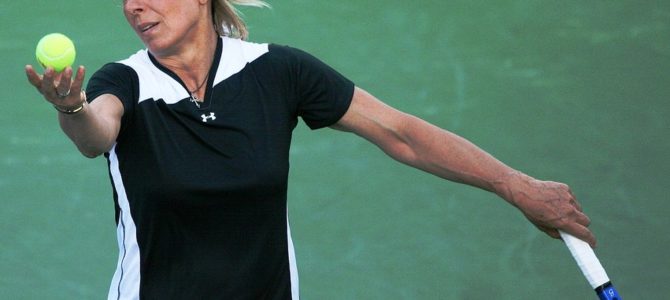
Tennis star Martina Navratilova entered the transgender debate late last year when she tweeted: “You can’t just proclaim yourself a female and be able to compete against women. There must be some standards, and having a penis and competing as a woman would not fit that standard.”
In that tweet and subsequent interviews, she reflected on the rising number of biologically male athletes using their greater physical prowess to outcompete their biologically female competitors. Following an outcry from a variety of LGBT groups, Navratilova apologized for implying that such unfair competition amounts to “cheating.” Her story says a lot about the current state of political discourse in America.
For those of us who grew up in communist Czechoslovakia in the 1980s, Navratilova was a source of pride and inspiration. She was the world No. 1 for a total of 332 weeks in singles and 237 weeks in doubles. She was year-end singles No. 1 seven times and year-end doubles No. 1 five times. She won 18 Grand Slam singles titles, 31 major doubles titles, and 10 major mixed doubles titles.
She holds the record for the greatest number of Grand Slams won by one player, male or female. She won the women’s singles title at Wimbledon a record nine times and remains the only player in history to win a major in four different decades. In 2005, Tennis magazine selected her as the greatest female tennis player of the previous 30 years.
Unfortunately, we in Czechoslovakia did not get to see much of Navratilova at her peak, for she was banned from appearing on state-owned television after defecting from her native land in 1975. That took courage, for Navratilova was only 18 years old and had to leave behind her entire family. As she noted later, she did not know if she would ever see her parents again.
She did, three years before communism collapsed, when she represented the United States, her adoptive country, in the 1986 Federation Cup final against Czechoslovakia in Prague. That trip also took courage, for there was always the possibility that she would be arrested on arrival. She was not, and the Americans won.
Navratilova came out as gay in 1981. Once again, that took courage, because American hostility (not to mention global hostility) toward homosexuals in the ’80s was real and made all the worse by the burgeoning HIV/AIDS crisis. Navratilova was mercilessly mocked for years because of her muscular physique, which stood in stark contrast with the feminine ideal exemplified by her greatest rival, Chris Evert.
She brought her partner to her matches and was coached by the first professional transgender tennis player, Renée Richards. The spectators were, at best, lukewarm toward Navratilova, and she lost out on millions of dollars in corporate endorsements at a time when being gay was decidedly uncool.
Navratilova supported the efforts to subdue the HIV/AIDS epidemic and got involved with other worthy causes, including animal welfare, children’s rights, and, of course, the fight for gay rights in America. In spite of a personal experience with socialism, Navratilova remained a woman of the left throughout her adult life, donating tens of thousands of dollars to the Democratic Party. That party, alas, has embraced the identity politics that risk turning Navratilova into a social pariah.
In a Sunday Times interview on February 17, Navratilova noted that “a man can decide to be female, take hormones if required by whatever sporting organization is concerned, win everything in sight and perhaps earn a small fortune, and then reverse his decision and go back to making babies if he so desires. … It’s insane and it’s cheating. I am happy to address a transgender woman in whatever form she prefers, but I would not be happy to compete against her. It would not be fair.”
The backlash was as swift as it was ruthless. A British transgender rights group, Trans Actual, tweeted: “We’re pretty devastated to discover that Martina Navratilova is transphobic.” The Canadian transgender cyclist, Rachel McKinnon, branded the tennis great “a bigot.” Athlete Ally, a group dedicated to supporting LGBTQ athletes, dropped her from its advisory board.
Throughout her life, Navratilova was always outspoken. Yet, over the weekend, she was compelled to write on her personal website that she is “sorry” for her poor choice of words. In a blink of an eye, decades of hard work on behalf of a variety of worthy causes seemed to have been forgotten. Generous reserves of personal capital and goodwill risked evaporating into thin air.
A woman unbroken by communism and vicious homophobia was forced to accommodate the perpetually outraged virtue signalers. That’s awesome power for the supposedly powerless.









